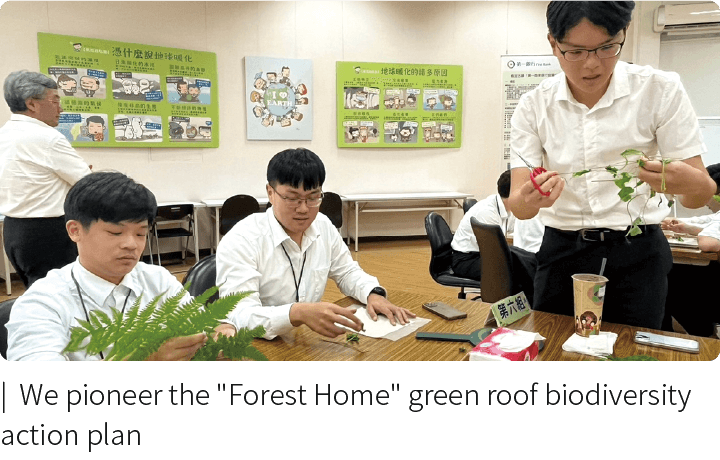Environmental Factors >
Green Operations and Net Zero Initiatives
Green Operations and Net Zero Initiative
To cooperate with the nation's 2050 net-zero emissions goals, FFHC has formulated near-term carbon emissions goals in accordance with SBTi approaches, which were reviewed and approved in June 2024. These goals stipulate that the Group's carbon emissions pathway for Scope 1 and Scope 2 of its own operations conforms to the goal of controlling global warming to under 1.5℃. By 2035, the annual carbon emissions are expected to be reduced by 63% from the baseline year (2022). Compared with the baseline year (2022), the amount of carbon reduction from Scope 1 and Scope 2 in 2024 totaled 3,105.45 MT CO₂e, or down by 14.43%. The amount of carbon reduction achieved by adopting paperless operation measures reached 14,977.82 MT CO₂e. Overall, the total amount of carbon reduction reached 18,083.27 MT CO₂e. The related measures and their results are described as follows:
Reduce GHG emissions
To implement our environmental sustainability initiatives, FFHC formed the "Green Building Certification Program" team in 2010, having revamped and converted its privately-owned branches and buildings into green buildings. As of the end of 2024, 38 buildings had been completed, including the revamp of 35 old buildings, which were subsequently awarded the Green Building Label from the Ministry of the Interior (including diamond grade for 29 buildings, gold grade for one building, silver grade for one building, bronze grade for one building, and qualified grade for three buildings). In addition, two new buildings have also been awarded with the gold grade Green Building Label. Our London Branch Building obtained the "PASS" grade green building certification from Britain's Building Research Establishment (BRE) in 2021, marking the first accolade for our overseas locations. We expect a total of 50 buildings to be awarded with green building certifications by 2030. Furthermore, First Bank's Headquarters Building has been certified as Level 1+ (Nearly Zero Carbon Building) for energy efficiency among existing buildings by the Ministry of the Interior. In 2024, we partnered with the Ministry of the Interior to hold the "Observation, Demonstrations and Visitation of Intelligent Net-Zero Building Benchmark Cases" event, and attendees included members of the Architecture and Building Research Institute, Ministry of the Interior and Taiwan Intelligent Zero Carbon Building Alliance. There were a total of 47 people in attendance, as the Group shared its experiences in energy conservation and carbon reduction while setting a paradigm for green buildings in Taiwan's financial industry.
In addition to gradually revamping our own existing branches and buildings to obtain the Green Building Labels, we have included all of our domestic and overseas business locations in the scope of "ISO 14064-1 Greenhouse Gas Inventory" for verification since 2017, in an attempt to have an overall grasp of the status of carbon emissions at the Group's various business locations. Since 2020, we have held carbon management and energy conservation contests among domestic business units for 5 straight years, as we strive to attain the goal of reducing our GHG emissions.
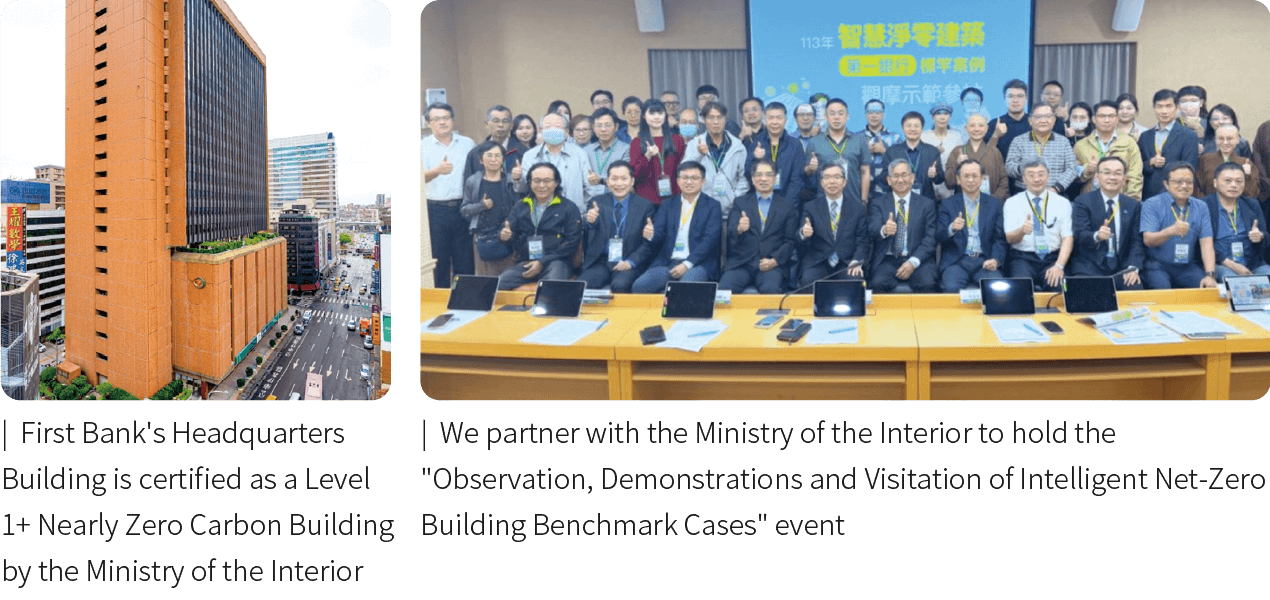
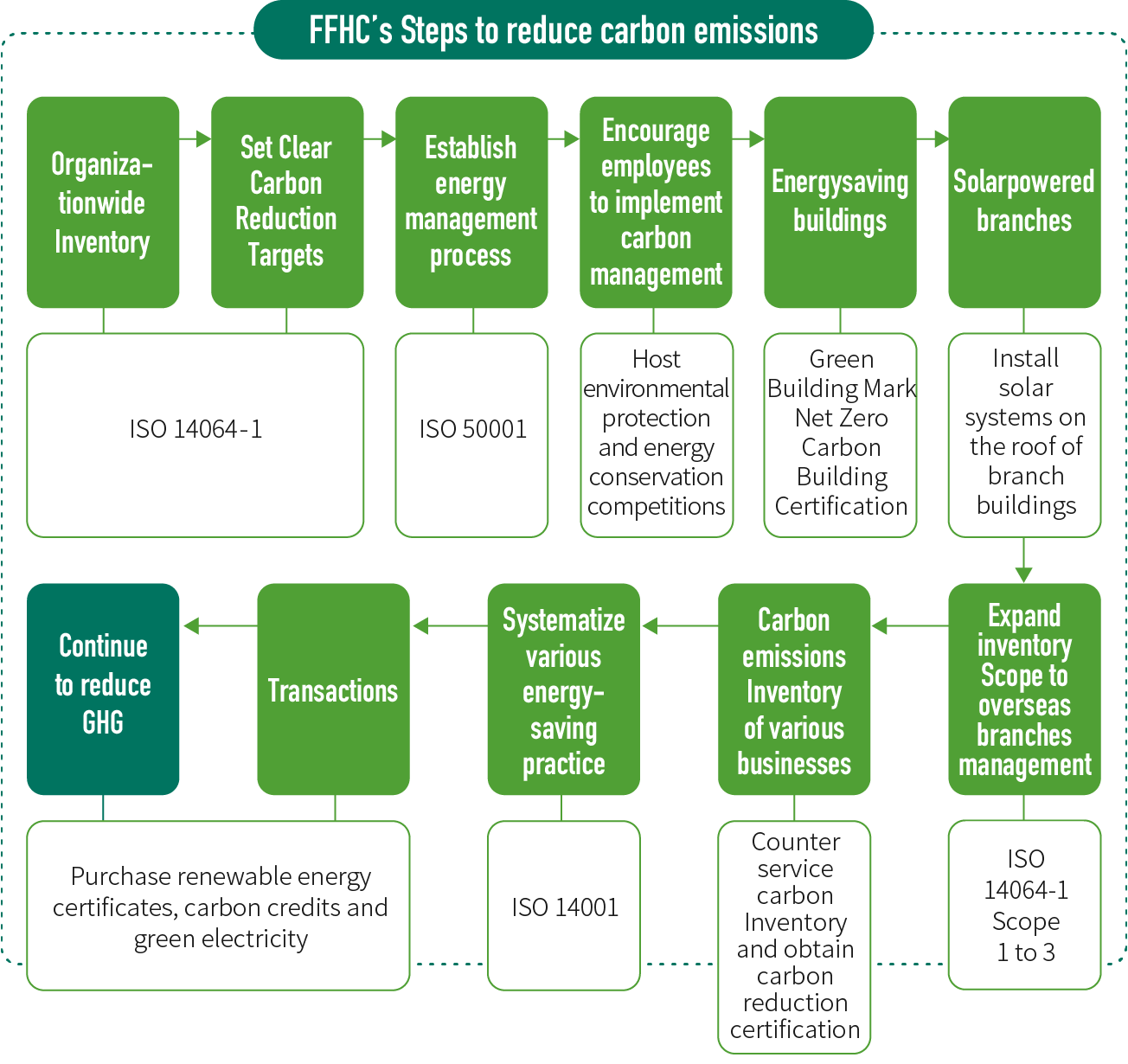
◎ Obtain Green Building Mark for 38 of the Group's buildings and the carbon emissions
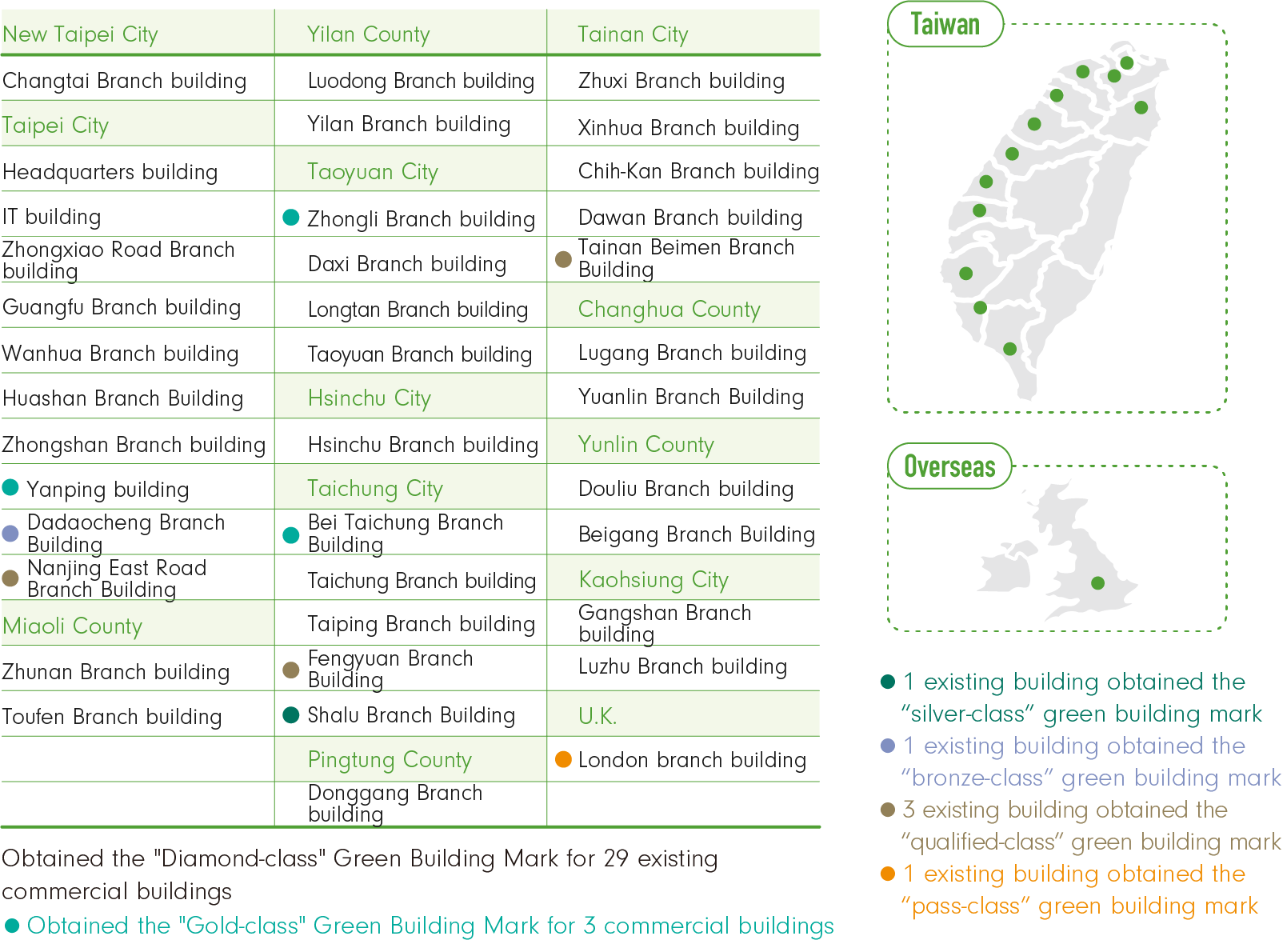

*1:The difference in performance between improved air-conditioning and lighting equipment and the usage time are used as main factors to estimate the carbon emissions reduction.
*2:Data provided in the evaluation statement (EEWH-RN Green Building Mark Application Evaluation Summary Table) approved by the Taiwan Architecture & Building Center.
◎ Obtained certifications relating to environmental management or energy administration
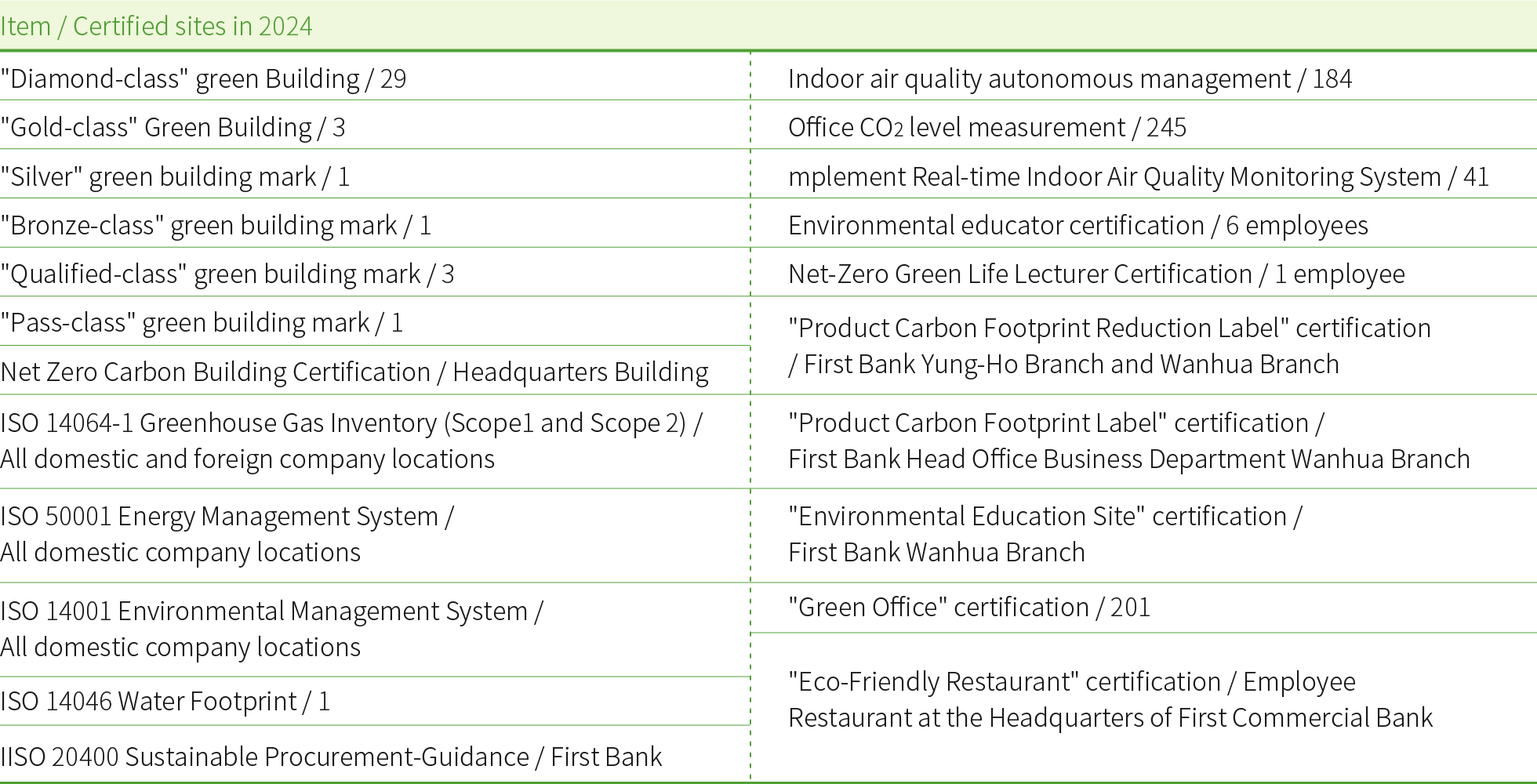
Set Clear Carbon Reduction Targets
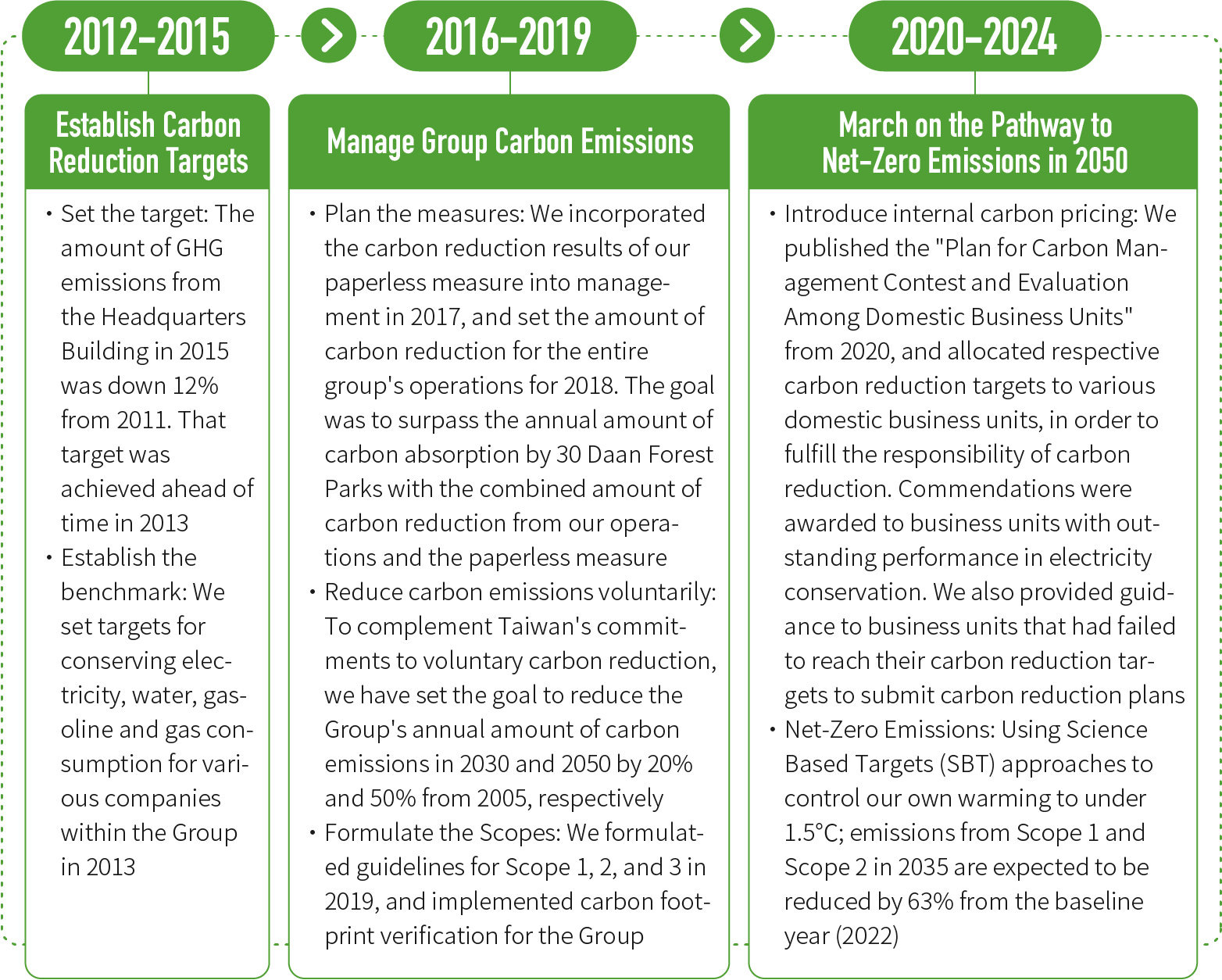
◎ 2025 Carbon reduction targets for various companies of the FFHC Group are as follows:
Formulation of the entire Group's carbon emissions goals remains consistent with the SBTi pathway specifying that global warming be controlled to under 1.5℃. In other words, emissions from Scope 1 and Scope 2 in 2025 must be reduced by 14.54% from the baseline year (2022), or a reduction of 3,128.21MT CO2e.
Unit: MT CO2e
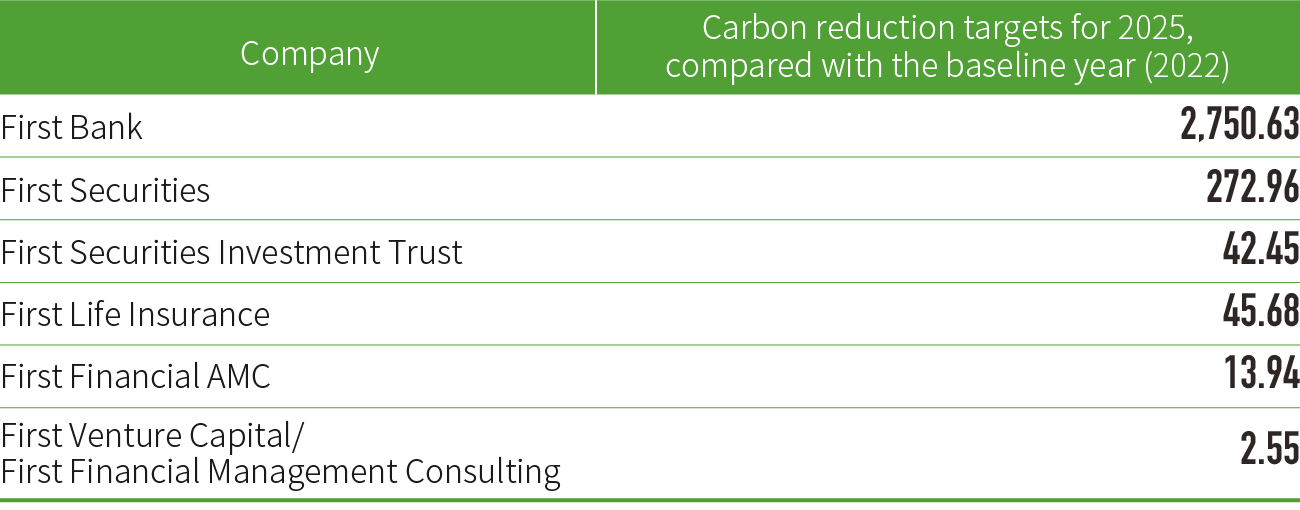
*:Compared with the baseline year (2022), the target is 3,128.21 MT CO2e in total carbon reduction
◎ FFHC's Near-Term Emissions Goals

◎ FFHC's Total Amount of Carbon Emissions
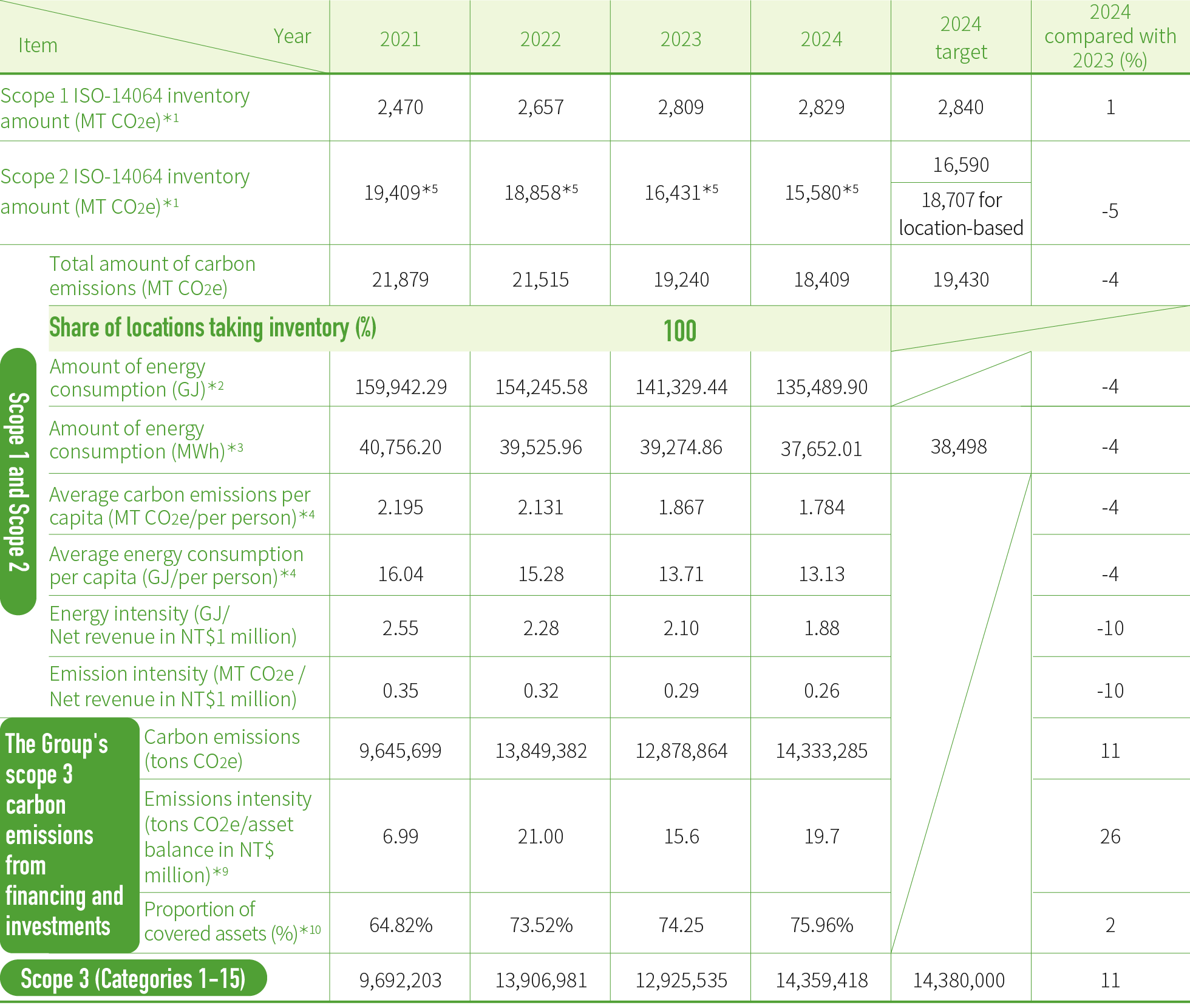
*1:Scope 1 emissions consist mainly of fuel used by company cars, generator diesel and natural gas. Scope 2 emissions consist mainly of electricity consumption, The emission factors used are based on the EPA's published greenhouse gas emission coefficient management table version 6.0.4; inventory conducted in 2021 was based on the global warming potential provided in the 2013 IPCC Fifth Assessment Report; inventory conducted from 2022 to 2024 was based on the global warming potential provided in the 2021 IPCC 6th Assessment Report; the method used to consolidate greenhouse gas volume is Operated Control Method; the inventory standard is based on ISO 14064-1.
*2:The scope of total energy consumption (GJ) mainly includes diesel used for the generators, gas, natural gas, diesel used for official vehicles,gasoline used for official vehicles, and electricity. The statistics are filed by each unit in accordance with related forms, compiled by the Sustainable Environment Work Group of the Corporate Sustainable Development committee, and verified by SGS. The coefficient from 2021 to 2024 is based on the parameters in the Heat Content of Energy Products in the Energy Statistics Handbook 2021.
*3:Amount of energy consumed in MWh (Megawatt Hour)
*4:The number of employees investigated was 9,969 in 2021, 10,095 in 2022, 10,305 in 2023,and 10,317 in 2024 .
*5:The Scope 2 inventory was market-based. The local -based inventory was 19,422 metric tons of CO2e in 2021 ; 19,442 metric tons of CO2e in 2022,and ; 18,980 metric tons of CO2e in 2023; 18,672 metric tons of CO2e in 2024.
*6:For 2024, we adopted the absolute contraction approach, using Science Based Targets (SBT) to control warming to under 1.5℃. We set the carbon reduction target that the Group's combined annual carbon emissions from Scope 1 and Scope 2 must be 9.69% lower than that in the baseline year (2022); The MWh target requires that the aggregate of official business vehicles' fuel consumption, diesel consumption of generators, and gas and electricity consumption be 2.6% lower than that in 2022.
*7:In 2024, we received no complaints over environmental impact or penalties for environmental violations.
*8:New and replacement air-conditioning systems all used the new eco-friendly R134a or R410a refrigerant. There was no use of Ozone Depleting Substances (ODS)
*9:The scope of emissions intensity is in equity investments, bond investments, and commercial loans.
*10:The assets are estimated based on the investment and financing balance of carbon emissions in the relevant accounting accounts of the financial report.
◎ Scope 3 in 2024 (Categories 1-15)
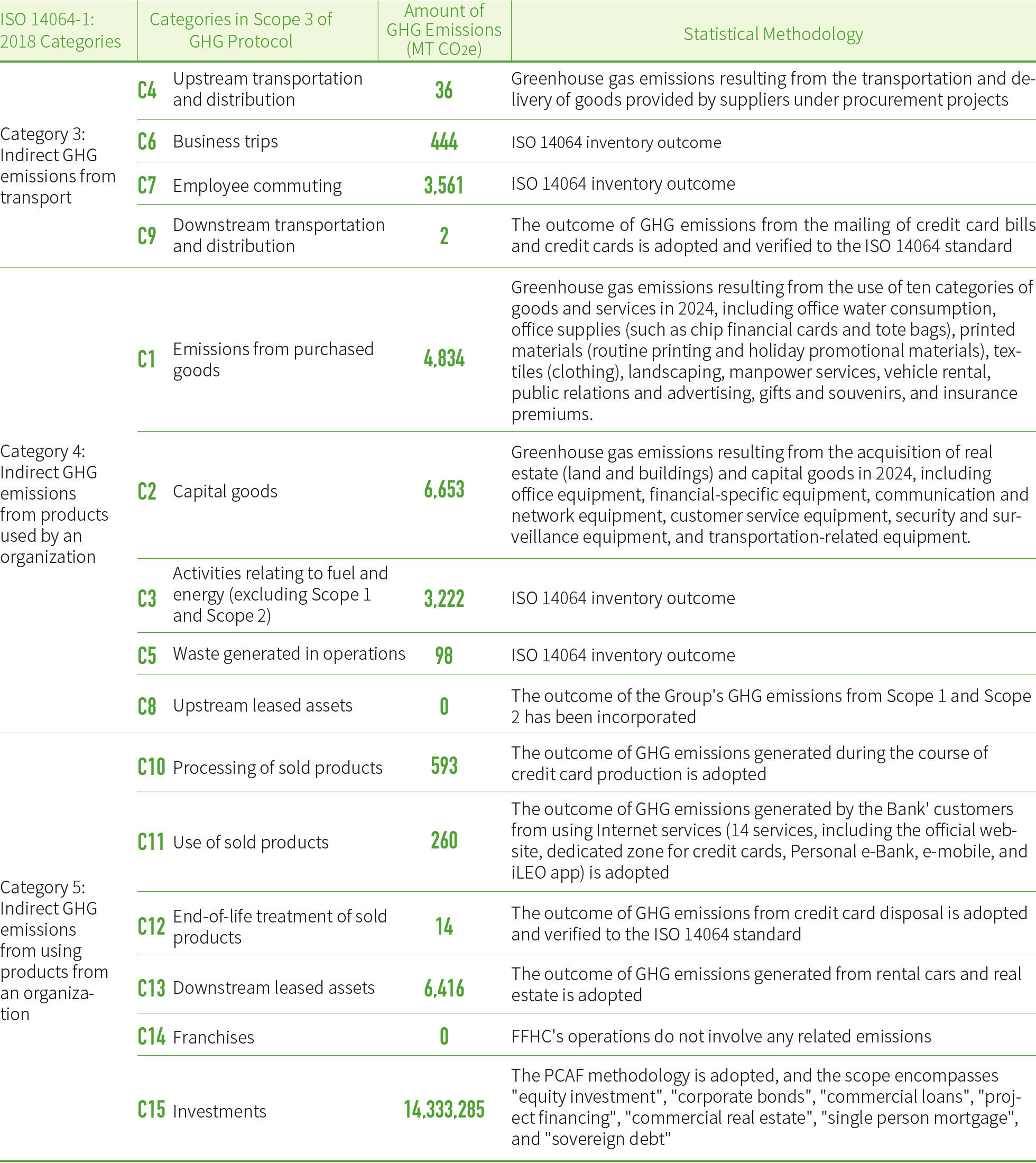
◎ Greenhouse gas emissions from 2021 to 2024

*:The Company does not emit NOx, SOx, and other significant air emissions
Green transportation
To reduce carbon emissions generated from official business transport, FFHC has introduced green transport to internal implementation, encouraging employees to use public transportation to commute to work. It has also established a public EasyCard system for employees, making it easier for them to take public transportation when they go out on a business trip. EVs, hybrid vehicles or vehicles with higher energy conversion efficiency are prioritized for evaluation when existing official business vehicles are up for replacement. As of the end of 2024, the Group had operated 196 hybrid official business vehicles, which accounted for 45% of all of our official business vehicles. We signed a corporate carbon reduction program with Uber in 2024, which prioritizes the use of vehicles with less emissions while reducing the fuel consumption and carbon emissions of our official business vehicles. We have also set up EV charging stations at our Zhongli Branch and Yanping Building for our employees and customers.
We have also progressively replaced motorcycles with traditional internal combustion engines that are nearing the end of their life cycle with electric scooters. 121 electric scooters had been introduced by the end of 2024, contributing to an annual reduction of around 45 MT CO2e*1. We have also installed battery swapping kiosks for electric scooters at vacant lots near seven of our locations, including our Zhongshan, Dadaocheng, Beitou, Xinxing, and Caotun Branch, as well as the Yanji Dormitory and Information Building, as part of our efforts to promote low-pollution, energy-efficient and smart scooters.In addition, we have set up 15 employees dormitories at company sites located in high population density areas as well as rural regions and remote areas, which help reduce carbon emissions of employees commuting to and from work.
*:The carbon reduction is based on Gogoro's 2016 report that the replacement with electric scooters can save 1.9175 kilograms of CO2e per liter of gasoline, and calculated according to the Ministry of Transportation and Communication's 2021 "Report on Motorcycle Usage Survey" that each motorcycle can travel an average of 23.2 kilometers per liter of gasoline based on the average annual motorcycle travel distance of 4,500 kilometers on the "Auto Energy Website". Calculation: 121 scooter*1.9175 kg CO2e*(4,500 km/23.2 km)/1,000=45 MT CO2e.
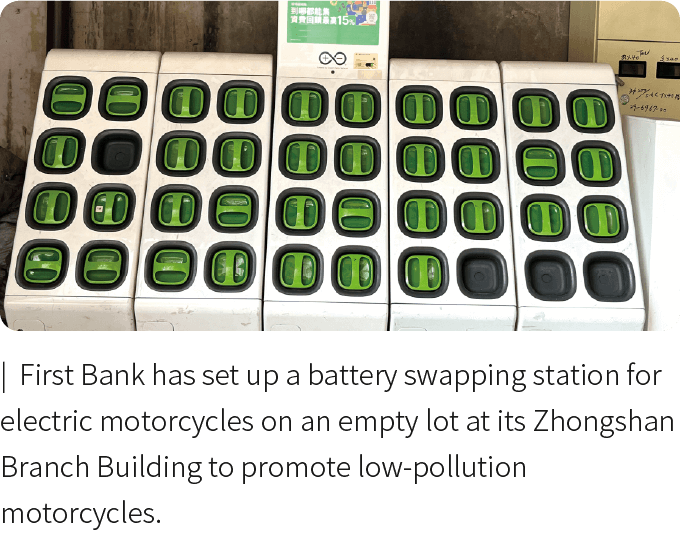
Carbon Footprint Management
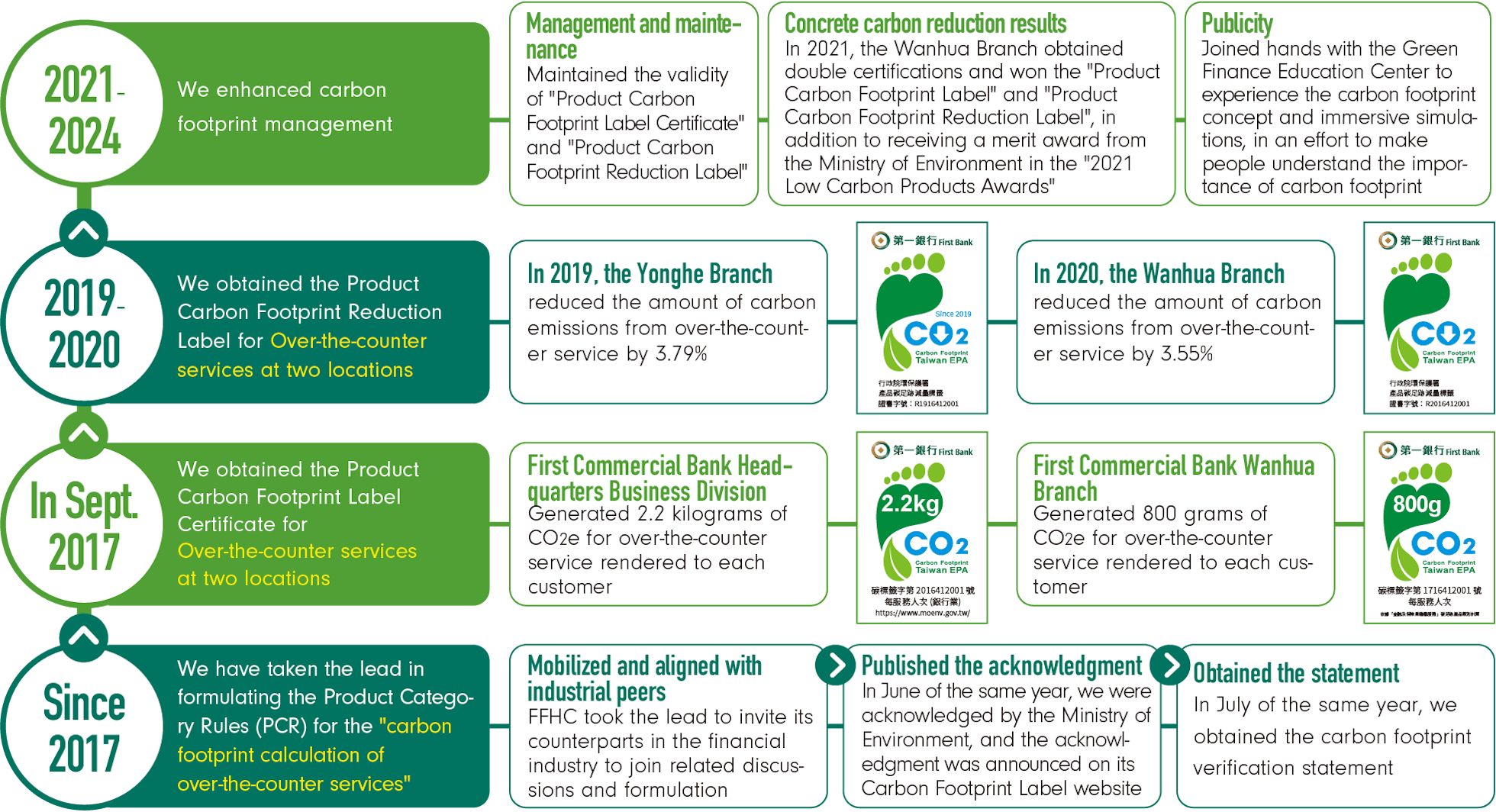
Use of Renewed Energy
Installation of Rooftop Solar Power Generation Systems
To respond to the green energy policy, the FFHC has used the renewable energy. Between 2015 and 2024, the Company purchased a total of 14.867 million kWh worth of green power, carbon credits and Taiwan Renewable Energy Certificates. In addition, after assessing the sunshine conditions of the operating sites, rooftop solar power generation systems were built in 2016. As of the end of 2024, 25 rooftop solar generation systems have been completed and the total annual carbon reduction amounted to 148.76 metric tons CO₂e. FFHC set goals for producing and using 250 MWh of renewable energy for 2025 and will continue to increase the proportion of the Group's use of renewable energy, so that we may implement environmental sustainability policies.
◎ Renewable energy consumption & green power purchases in the past years

*1:In 2021, we purchased 181 metric tons of carbon credits (which equaled 360,558 kWh in the use of renewable energy), 27,000 kWh of renewable energy certificates and 652,000 kWh of green electricity;In 2022, we purchased 85 metric tons of carbon credits (which equaled 166,994 kWh in the use of renewable energy), 110,000 kWh of renewable energy certificates and 1,517,000 kWh of green electricity; In 2023, we purchased 138 metric tons of carbon credits (which equaled 278,787 kWh in the use of renewable energy), 93,000 kWh of renewable energy certificates and 3,175,000 kWh of green electricity; In 2024, we purchased 228,000 kWh of renewable energy certificates and 6,030,821 kWh of green electricity.
*2:The coefficient for 2021~2024 is based on the parameters in the Heat Content of Energy Products in the Energy Statistics Handbook 2020.
*3:The "Electricity Carbon Emission Factor" is announced every year by Bureau of Energy, MOEA.
◎ 25 Rooftop Solar Power Generation Systems until 2024
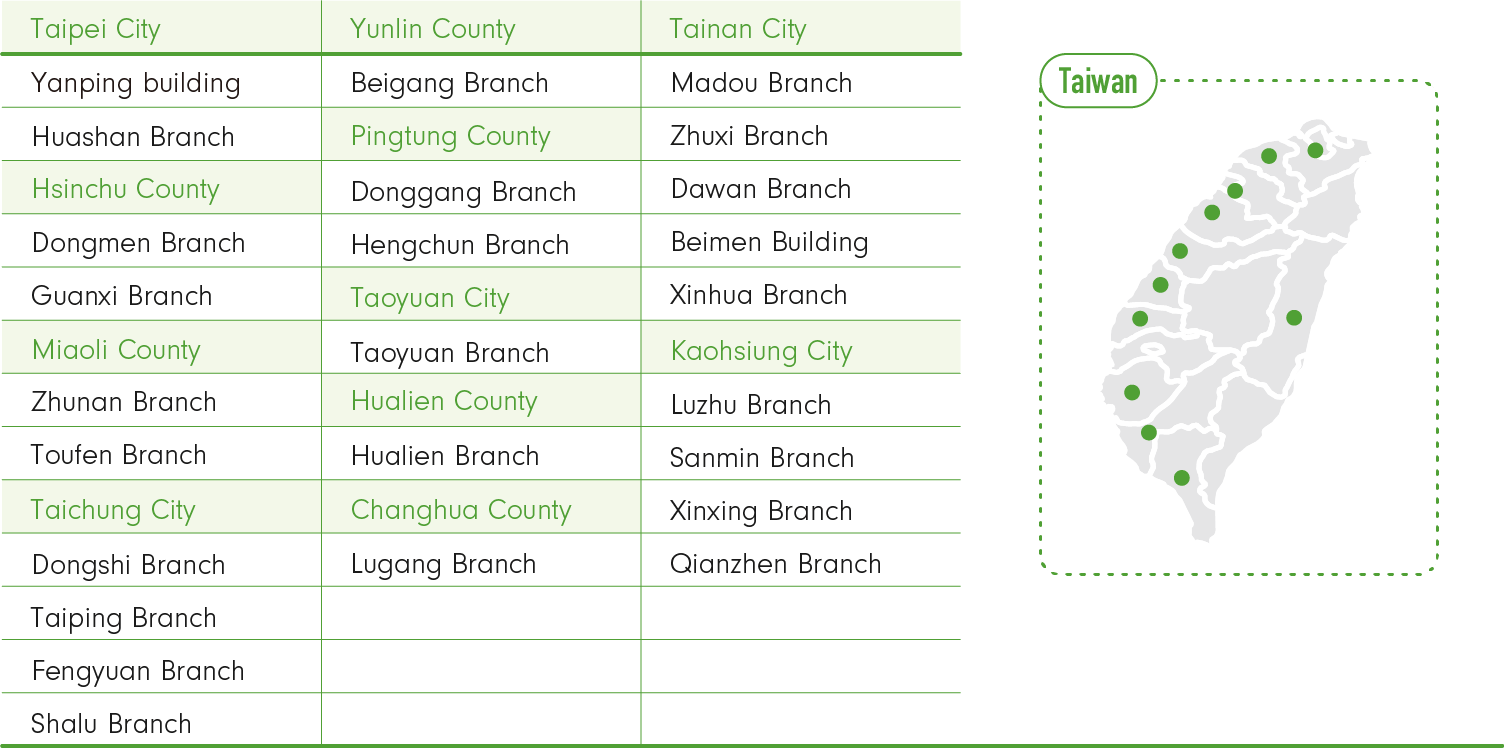
◎ Carbon Emissions Reduction of Rooftop Solar Power Generation Systems

*:The "Electricity Carbon Emission Factor" is announced every year by Bureau of Energy, MOEA.
Green power wheeling intended to promote the use of renewable energy
To promote the practice of transporting renewable energy to our branches, the Group has signed green power wheeling agreements with renewable energy vendors and purchased green power compatible with the "Bundled REC System", which allows for direct deduction of electricity consumption from our Taipower bills while substantially reducing the amount of carbon emissions. From December 2021 to the end of 2024, 22 of the Group's business locations had utilized green power. 11,327,821 kWh in green power has been used cumulatively so far, and we expect to increase the share of green power year by year.
Solar power generation & hydroponic green roof with rainwater harvesting
FFHC is devoted to promoting its green building policy, as well as reducing the effects of urban heat islands. The Group has built three "zero carbon green roofs" at its Wanhua, Huashan and Chang'an Buildings so far, which incorporate the concept of ecological hydroponics, aquaponics and landscape gardens. A rainwater harvesting system has been designed to replenish the aquaponic system with water. We use solar voltaic panels to generate electricity to power system circulation, including decontamination, filtration and water purification. With the aquaponic system, we can grow vegetables and fruits on the water while farming fish in the water. Fish excreta serves as a source of nutrients for the vegetables and fruits that we grow. The roofs also provide employees with a multi-function green space for resting, showcasing the "trifecta" idea incorporating production, life and ecology. Bilingual self-guided interpretive signs and audio tour systems have also been installed at the green rooftops of the Wanhua and Huashan branches, offering diverse environmental education learning models.

Played the role of the green landlord to support tenants to use green electricity
To engage tenants at our own buildings in converting to green electricity, we have responded to the "Demonstration & Guidance Program for Multiple Users Sharing One Customer Number" pushed forward by the Ministry of Economic Affairs since 2024. This program, also known as the green landlord policy, allows the Group to help its tenants in need of green electricity to purchase green electricity, which is transferred to our privately-owned buildings, before it is distributed to the tenants. As of the end of 2024, we had successfully engaged two tenants in adopting green electricity. The amount of green electricity used annually is around 13,000 kWh.
Reducing Water Use and Conserving Water Resources
In 2012, FFHC realized the idea of rainwater harvesting and reuse by installing a 1.3 million-liter rainwater recycling tank in the basement of our Headquarters Building, which is used for watering gardens and flushing toilets. Apart from the Headquarters Building, the Company also duplicated that experience at other branch office buildings. We installed rainwater recycling tanks at our Yanping Building and Zhongli Branch in 2020. A rainwater harvesting system was installed at the Wanhua Branch, which is used to water the green roof to take full advantage of water resources.
In 2024, the Group's total water consumption was 235.45 million liters. Tap water therefore made up 99.98% of the water consumption and 0.02% came from the Headquarters building basement's overflow and rainwater. FFHC investigated water consumption at each company including operating sites. Apart from First Bank's existing domestic locations of operations, securities firms, securities investment trust enterprises, life insurance companies and the AMC Head Office, units included in calculating the total amount of water consumption also expanded to encompass securities firms, securities investment trust enterprises, life insurance companies and AMC's domestic locations of operations in 2022.
In order to improve water use efficiency, the headquarters building introduced the "ISO 46001 Water Efficiency Management Systems" and obtained certification in 2021, strengthening water resources management measured by implementing and optimizing the daily management of major water-consuming equipment, as well as through the water use review and performance evaluation, including using a management and monitoring system to control the operations of each water pump. Water consumption at each operating site was regularly investigated to see if there was any leakage in the piping and facilities. Speedy repair was a must in case of leakage. Certified green water-saving devices such as water-saving tap fittings, 2-stage flushing toilets, and sensor-controlled urinals were also installed to reduce water usage. We adjust the kitchen dishwashing process to save washing water. In addition, to protect water resource, we have installed an oil trap in the headquarters' on-site kitchen, utilized eco-friendly cleaning agents, and used warm water to clean dishes, which will reduce the quantity of cleaning agents used. In addition, we have engaged contractors to carry out septic tank pumping on a regular basis and conducted wastewater testing to determine the directional flow of contaminants, thereby improving overall water quality and reducing pollution.
◎ FFHC's Consumption of Municipal Water Supplies
Unit: million liters

*1:FFHC's water consumption statistics are mainly filed by each unit in accordance with water bills and compiled by the Sustainable Environment Work Group of the Sustainable Development Committee.
*2:The scope of coverage in 2021 included all of First Bank's domestic locations of operations, securities firms, securities investment trust enterprises, life insurance companies and the AMC Head Office. Securities firms, securities investment trust enterprises, life insurance companies and AMC's domestic locations of operations were added in 2022. First Bank's overseas locations of operations have also been added to the pool in 2023. In 2025, overseas business locations of First Bank will be excluded.
Upgrading IT Equipment: Paperless Operations
FFHC strives to improve the performance of our IT equipment while phasing out old servers. We have implemented paperless teaching, paperless meetings, paperless service rendering, and paperless office administration. The entire credit investigation/credit extension procedure is run on the system, which automatically introduces data from the Joint Credit Information Center, as well as account consolidation for domestic and overseas group account holders. Additionally, digital services have been introduced to the process of service rendering, including nodes such as marketing, transactions, payment and accounting. First Bank even partnered with "Space4M", an AOU subsidiary, to install the WMS digital content public performance system at its 184 branches across Taiwan in 2023. Through the WMS dashboard management system, we can conduct real-time management of the displays at our branches remotely, in addition to distributing advertisements and marketing materials, as we provide more premium digital service experiences and gradually march towards paperless marketing.
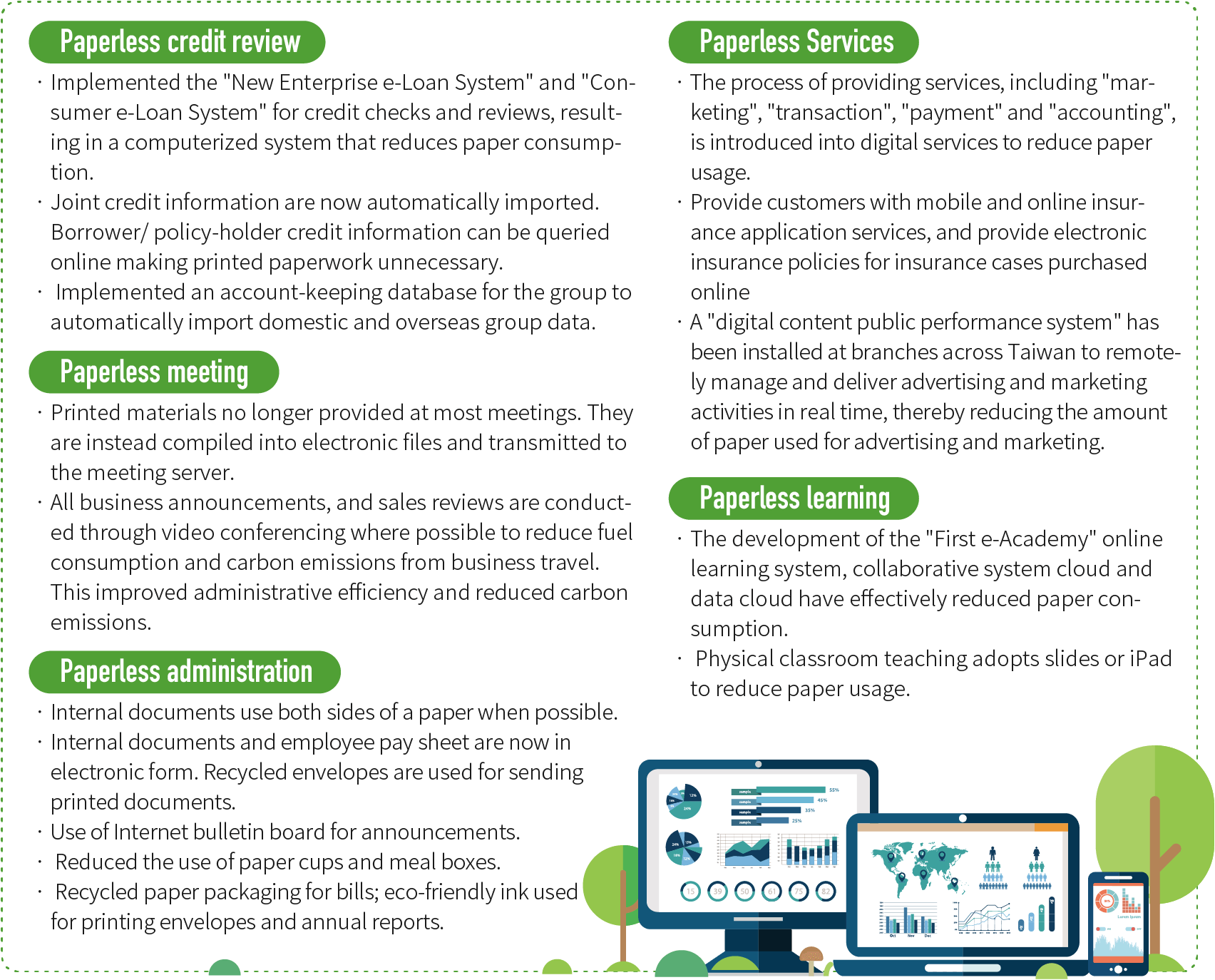
◎ Carbon reduction at FFHC from paperless initiative
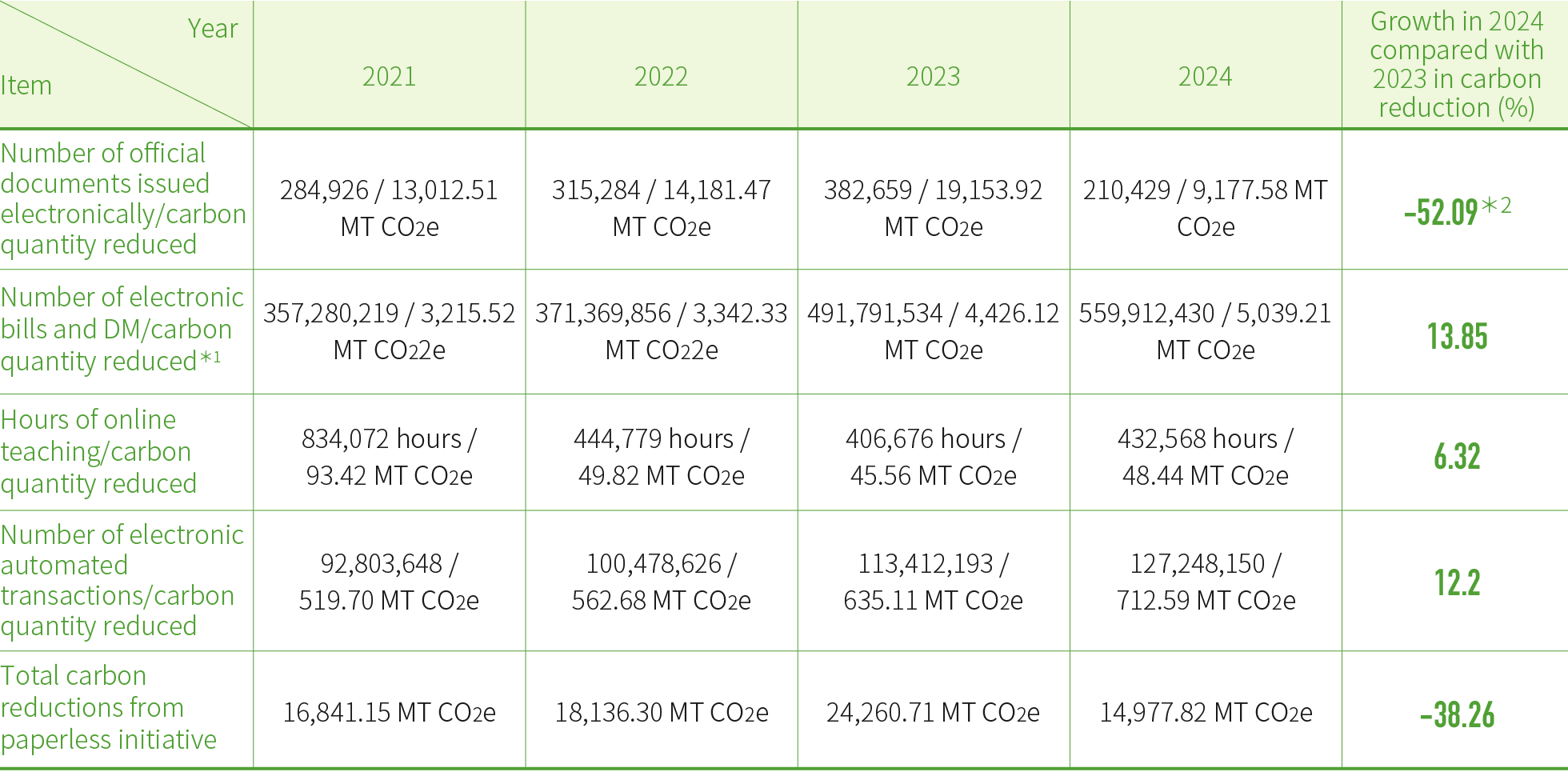
*1:The carbon quantity reduced from electronic billing and DM was calculated based on the Taiwan Products Footprints Information Network on the official website of EPA, Executive Yuan: one sheet of B4-sized paper meant 0.009 kg of CO2e emissions; the carbon quantity reduced from electronic automated transactions was based on the same source: one sheet of A4-sized paper meant 0.0056 kg of CO2e emission.
*2:The reason why the number of electronic official documents dropped significantly in 2024 is because the number of related electronic official documents seized by courts reduced sharply.
◎ Carbon quantity reduced from official documents issued electronically in 2024

*1:The carbon quantity reduced from electronic official documents was calculated based on the Taiwan Products Footprints Information Network on the official website of EPA, Executive Yuan: one sheet of A4-sized paper meant 0.0056 kg of CO2e emission.
*2:Carbon reduction amount = the times of usage * the number of users * the amount of carbon emission per A4 paper / 1,000
◎ Carbon quantity reduced from online teaching in 2024

*:Carbon reduction amount = course hours * assuming that the online course saves 20 sheets of A4 paper per hour * the carbon emission per A4 paper / 1,000
Recycled Wastes
To maximize resource sorting, recycling and reuse, FFHC makes it a rule to set its annual resource recycling target every year. In addition to strictly enforcing the policy of zero trash bins and zero personal trash bins in the office, it also installs garbage recycling and sorting cans on each floor, prompting employees to bring their trash to the cans for garbage sorting and recycling. We also continue to weigh general waste and resource garbage, demanding that domestic business locations of the Group's companies units conduct resource recycling, sorting, and garbage amount calculation.
To create a premium green office environment for our employees, we converted the recycling area on the sixth floor of the Headquarters Building into the first "Resource Circulation Experience Zone" in the financial industry in April 2024. With the help of graphics, we are able to teach employees to learn how to correctly sort kitchen waste as well as items for recycling, in order to improve the rate of sorting garbage correctly, as we concretely responded to one of the National Development Council's 12 carbon reduction goals by 2025-"zero waste through resource circulation".
◎ Recycled Waste, and Garbage removal volume of FFHC over years
Unit: Tons

*1:From 2021 to 2022, the coverage included all domestic business locations of the Group's companies; in 2023, overseas business locations of First Bank were added, while in 2025, overseas business locations of First Bank will be excluded.
*2:The percentage of sanitary landfill volume and waste incineration volume is estimated based on the data in the 2022 annual report of the EPA.
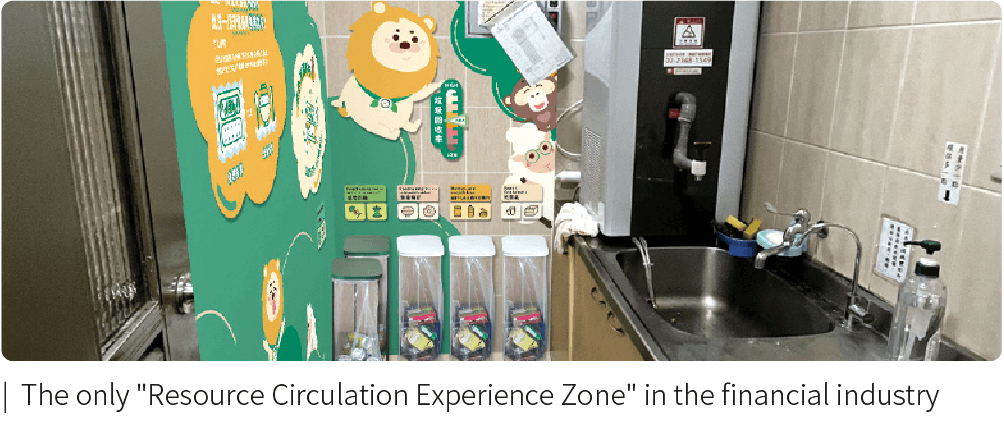
Biodiversity Action
FFHC continues to deepen its employees' and people's sustainability ideas and actions for a green financial environment.
・Optimizing the Green Finance Education Center: The center is the only certified environmental education facility and field in the financial industry. At the invitation of the Ministry of Environment, First Bank shared its experience in obtaining outstanding evaluation results in April 2024. The Bank completed certification extension for the Ministry of Environment's environmental education facility and field in December, in addition to completing installation of the bilingual self-introductory exhibition sign and audio guide for the green roof.
・We conducted a total of 41 sessions of environmental education courses in 2024, with a total of 1,321 participants coming from corporations, government agencies and schools. We have been chosen as a designated environmental education facility for visitation by the Control Yuan's Committee on Social Welfare and Environment Hygiene Affairs as well as the Ministry of Environment.
・To enhance Group employees' competences with respect to environmental education, we have required that all Group employees attend environmental education training since 2015, with each employee receiving an average of more than two hours of training every year. Currently, the Group has six environmental education personnel certified by the Ministry of Environment and one instructor for net-zero green life, who are responsible for compiling and executing environmental education courses. As of the end of 2024, four sets of environmental education courses for green finance, certified by the Ministry of Environment, had been rolled out: "Conserve Energy and Reduce Carbon Emissions with Green Buildings", "Climate Change Risk Management", "Green Loans & Financing Review", and "Green Consumer Finance".


Encourage Employees to Submit Proposals; Environmental Competitions; and Internal Carbon Pricing Efforts
To complement the drive for the internal carbon pricing policy and to reduce carbon emissions from scope 2 electricity consumption, First Commercial Bank has conducted the "Carbon Management and Energy Conservation Contest Among Domestic Business Units" since 2020, and allocated carbon reduction targets to various domestic business units. The target achievement status of each unit on energy conservation would be published on a quarterly basis. Their target achievement rates are tallied and published by the end of each year. These contests awarded 73 commendations to individuals credited with outstanding performance in energy conservation between 2021 and 2024, and awardees included bank clerks and deputy supervisors. Business units failing to achieve their energy conservation targets were given carbon pricing reports so that they understood the cost of carbon emissions they should have paid for exceeding the target limits. They were also required to submit their carbon reduction improvement plans. Implicit prices have been adopted with respect to the types of internal carbon pricing, and the related price setting is based on the cost of reducing one metric ton of carbon calculated from the actual carbon reduction measures as well as the amount invested in carbon reduction (including green electricity wheeling, green building improvements, and the construction cost of installing rooftop solar panels, etc), which is in turn used for analyzing the cost-effectiveness of equipment. After calculation, the cost of reducing one metric ton of carbon was NT$4,725 in 2024. Compared with the baseline year (2022), domestic business units conserved around 736,000 kWh of electricity in 2024 cumulatively, or a reduction of around 363.7 metric tons of carbon. Potential external carbon cost reduced as a result of carbon reduction through investments in carbon reduction measures and various units' own electricity consumption management was NT$1.718 million. These competition results, converted into internal carbon pricing and energy conservation performances, are also incorporated into assessments on all office building renovation projects as well as considerations for external electricity procurements and conservation reviews, which serve as the reference and foundation for the Group's overall resource deployment and decision-making for operational strategies. Additionally, the "FCB Living Green e-Newsletter" would also share the experiences of business units with outstanding performance in order to increase the effectiveness of carbon reduction. Since 2024, First Securities and First Financial AMC have also held energy conservation contests in order to reinforce the Group's carbon reduction effectiveness. Furthermore, all employees have been encouraged to submit proposals for environmental protection and energy conservation measures since 2014. The Group received a total of 10 submissions in 2024, and two of them were eventually adopted.
Eco-Friendly Restaurants
The Company has installed an eco-friendly employee restaurant in its Headquarters Building, which has received the Eco-Friendly Restaurant certification from the Ministry of Environment. In the meantime, we also echo the Ministry of Environment's "Ten Moves to Cherish Food" campaign, and purchase our daily food ingredients from nearly organic farms, which not only supports small local farmers, but also ensures the freshness of our food ingredients while reducing the carbon footprint of food; Reusable utensils are provided for repeated use, and we also use environment-friendly detergents to clean them. The first Wednesday in the first week of each month is designated as the "Meatless Day", and wholesome and low-carbon menus are designed by professional dietitians to encourage employees to reduce carbon emissions and love our Earth through their daily diet.
To echo circular economy, we have been converting food waste into compost via sorting, collection and resourcezation since 2023, using the fractal accelerated fermentation approach to turn kitchen waste generated by the eco-friendly restaurant into fertilizers. So far we have collected more than six metric tons of kitchen waste, and produced around two metric tons of organic soil mixture. We have also received the "Green Gold Manure" fertilizer registration certificate issued by the Ministry of Agriculture. The "Green Gold Manure" has seen application at the First Bank Green Finance Education Center, First Financial & Economic Office Building and the green roof of our Chang'an Building, providing plants with necessary nutrients while promoting resource circulation and reuse.
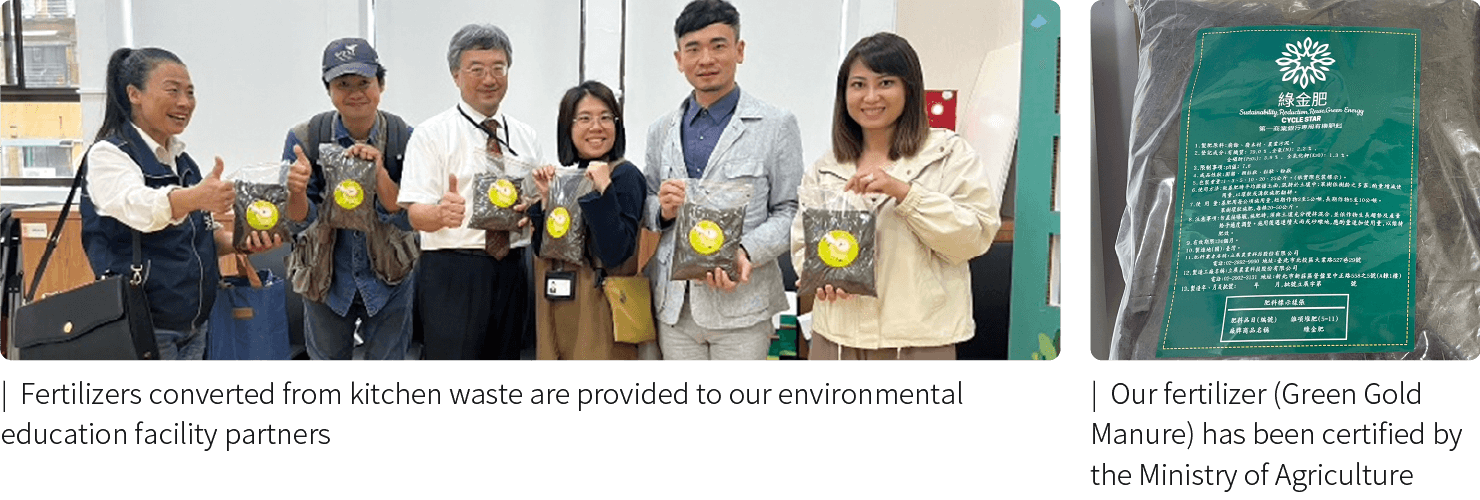
Biodiversity Action
The Group utilizes systemic approaches to demonstrate our conservation resolve to achieve biodiversity and environmental sustainability:
・We have partnered with the Kuroshio Ocean Education Foundation to drive the "Ocean Oasis—Ecological Conservation Project for Whales Along the East Coast", and put forth a science-based conservation strategy. Since 2022, we have been advancing the "Carbon Sink Research Program for Whales & Dolphins" through installing underwater hydrophones and the individual photo identification (Photo-ID) of sperm whales, in an attempt to analyze nearshore sperm whales' and Risso's dolphins' contribution to ocean carbon sink near Hualien. The ultimate goal is to obtain the United Nations' Important Marine Mammal Areas (IMMAs) certification. We also hosted the "Ocean Oasis—Special Exhibition for the Ecological Conservation of Whales off Hualien" at our Headquarters Building in December 2024.
・We lent our support to the Taipei Zoo's "Story House for Endangered Animals", and co-organized and conducted exhibitions and activities. We also adopted a rare and precious protected animal species in Taiwan-the "Taipei grass frog", responding to related environmental issues through actual action. We also incorporated it into our employee family event-"First Bank Family Day-Take It Easy and Have Fun". Furthermore, we also collaborated to produce a Podcast program so that the general public could better understand the importance of conserving endangered animals.
・We also pioneered the "Forest Home" green roof biodiversity action plan. In partnership with the Zhishan Cultural and Ecological Garden, our environmental education partner, we have jointly created the first demonstration site for urban stepping stones in the financial industry at two of the Group's zero-carbon green roofs (Green Finance Education Center and First Financial & Economic Office Building). We organized two sessions of Green Action Summer Camp for Sustainable Finance and one session of competence enhancement training for newly recruited management associates (MA). We facilitated our employees' and community folks' participation, as they used materials such as abandoned tree branches, wood trimmings and wire shelves to produce various animal habitats.
・We were the first to echo the Ministry of the Interior's "Forum for Promoting and Building the Sustainability Belt in Formosa", and took part in the pep rally in November 2024 to respond to the "30 x 30" biodiversity consensus with action, as we strive to realize the target of conserving 30% of global biodiversity by 2030.


